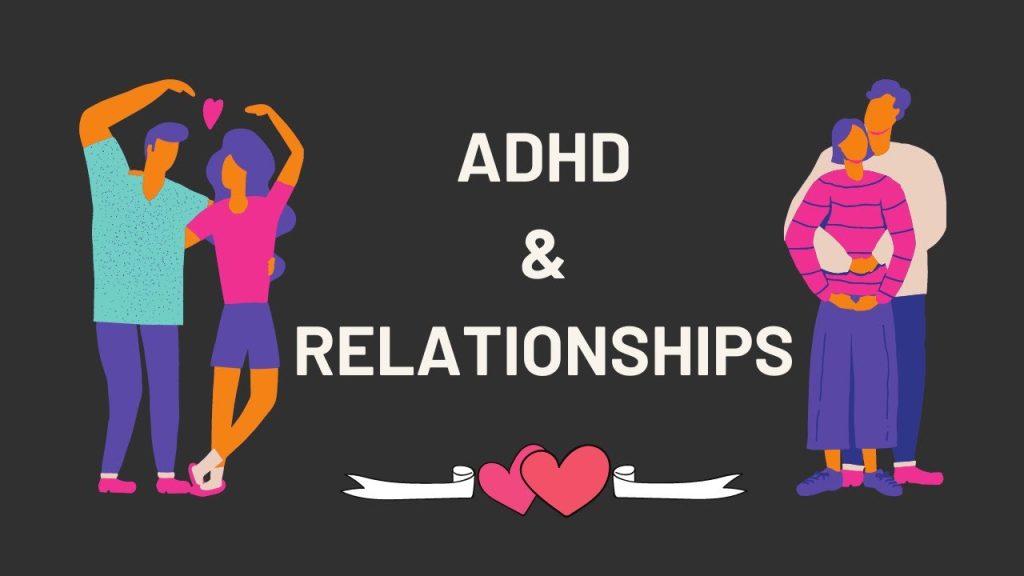Relationships are hard enough. When you throw ADHD into the mix, it can start to feel impossible. But with some understanding and work, couples with ADHD can live happy, fulfilling lives together. This article will cover a variety of issues that may arise in an ADHD relationship and offer advice on how best to deal with them (ADHD And Relationships).
Contents
- 1 Understanding ADHD In Adult Relationships
- 2 Symptoms Of ADHD That Can Cause Relationship Problems
- 3 The ADHD Gap
- 4 Dealing With ADHD In Relationships
- 5 Helping Your Partner With ADHD
- 6 Tips For Increasing Understanding In Your Relationship
- 7 Practical Tips For Relationships With ADHD
- 8 Expert Comments On ADHD And Relationships
- 9 Talking To a Professional
- 10 Conclusion
- 11 A Word From Mantra Care
Understanding ADHD In Adult Relationships

It is important to remember that ADHD does not just affect children. As it can also have a significant impact on adults and their relationships. It is estimated that between 60-80% of adults with ADHD have never been diagnosed. This means that many couples are likely struggling without even realizing it.
The symptoms of ADHD can cause all sorts of problems in relationships. For example, impulsiveness may lead to reckless behavior or poor decision-making. Inattention can cause partners to feel ignored or neglected. And hyperactivity can lead to constant arguments and conflict.
How Does ADHD Or ADD Affect Relationships?
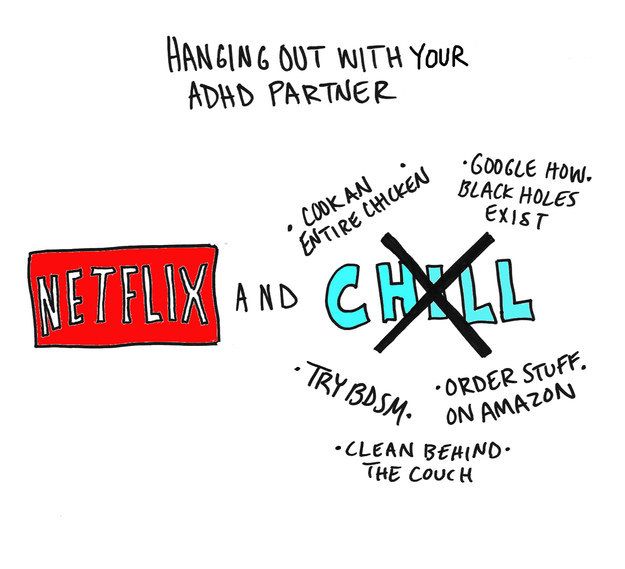
There is no one answer to this question as every relationship is different. However, there are several common issues that people with ADHD and their partners frequently face.
Communication Problems
When you have ADHD, your brain often has trouble processing information in the same way as other people do. This can make it difficult to read body language or facial expressions. As such, nonverbal cues may be missed altogether or misinterpreted. This can lead to misunderstandings and conflict.
Trouble Staying On Task
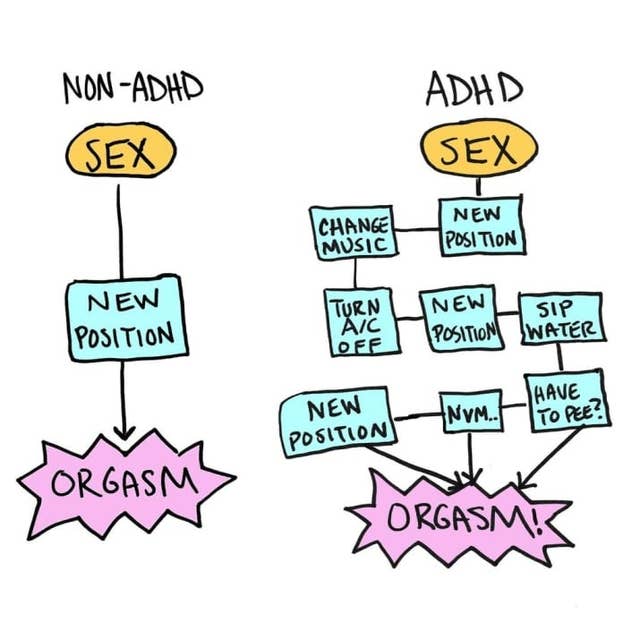
Another common issue is that people with ADHD often have trouble staying on task. They may be easily distracted or find it difficult to focus for long periods. This can make completing everyday tasks, like taking care of the household chores, a challenge. And when partners are constantly having to pick up the slack, it can lead to resentment.
Relationship Burnout
Another issue that ADHD couples have to deal with is relationship burnout. This occurs when partners are constantly having to manage all of their partner’s symptoms and behaviors rather than focusing on themselves. It is common for people who live with ADHD partners to feel like they don’t get a break. They are always on the defensive, constantly fighting, and never able to relax.
Symptoms Of ADHD That Can Cause Relationship Problems
The symptoms of ADHD can have a major impact on relationships. Partners may feel that they are constantly walking on eggshells, never knowing what will set their loved one-off. They may feel like they are constantly trying to please someone impossible to please. Several different symptoms can cause relationship problems. Let’s look at a few of the major ones:
Impulsivity
Impulsive individuals are often unable to control their impulses, which means they do things without thinking about the consequences. They may make bad decisions or get themselves into trouble because of this impulsiveness. These behaviors can negatively affect relationships by causing stress, conflict, and resentment.
Impulsiveness
Impulsiveness can take many different forms. For example, it may cause individuals to be irresponsible or unreliable. They never seem to get anything done on time and often leave relationships hanging in the balance due to their inability to communicate with partners about tasks that need completing before a certain date. Another form of impulsivity is risk-taking. This can lead to dangerous situations that can potentially harm both the individual with ADHD and their partner.
Inattention
Inattentive individuals are often easily distracted and have a hard time focusing on anything for an extended period. They may forget important details, lose things frequently or struggle to stay on task. This can cause problems in their relationships by causing resentment and frustration. It can also lead to a lack of attention or affection which may result in the partner feeling unloved and neglected.
Hyperactivity
Hyperactive individuals are often unable to sit still, fidget constantly, or talk excessively. These symptoms tend to make it difficult for them to pay attention or focus on anything for an extended period. This can lead to problems in relationships by causing partners to feel overwhelmed, harassed, or exhausted. It can also be disruptive and cause a lot of arguments.
The ADHD Gap
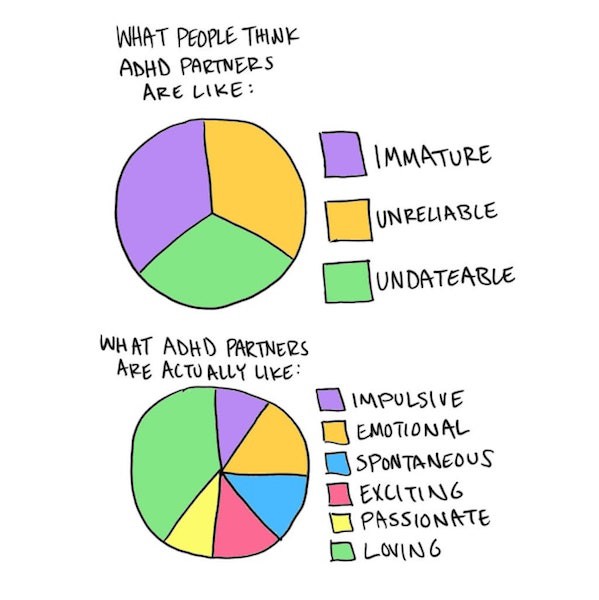
It is important to recognize that both partners in an ADHD relationship are often struggling. While it may seem like the partner with ADHD has all of the problems, they can be just as difficult for their non-ADHD partner who feels constantly overwhelmed and exhausted.
The Partner With ADHD Often Feels
If you have ADHD, it is important to understand that your partner is not just “being difficult”. The symptoms of ADHD can be very frustrating and overwhelming for them.
You may feel like you are constantly having to explain yourself and they don’t understand. They may feel like there is nothing that you can do right. It makes it impossible for them to show love or affection. You both need to realize that ADHD affects your partner’s feelings as well as yours.
When the person with ADHD knows this, their behavior often changes dramatically because they are trying to please their partner. They may be more willing to compromise and less likely to fly off the handle at every little thing.
The Non-ADHD Partner Often Feels
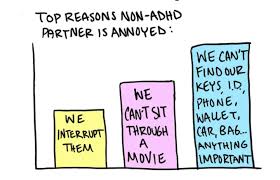
On the other side of this, the non-ADHD partner often feels like they don’t get a break and no one understands what it is like to be in their shoes. They may also feel resentful that their ADHD spouse seems unwilling or unable to change. And while the non-ADHD partner may want to help, they often feel inadequate and helpless.
If you are not the person with ADHD, it is important to understand that your partner’s condition is not your fault. You did not cause it and you cannot cure it. It is also important to remember that you are not alone. There are many other couples out there who are struggling with the same issues.
You may feel like you are constantly walking on eggshells, afraid of saying or doing the wrong thing. You may feel ignored and neglected because your partner is always distracted or busy. Or you may feel like you are not being heard or understood.
They never know what to expect or when their partner will get distracted and stop listening completely. The non-ADHD partner may also worry about how well their ADHD spouse is taking care of themselves, especially if the symptoms cause them to neglect crucial tasks such as eating right or getting enough sleep.
Dealing With ADHD In Relationships
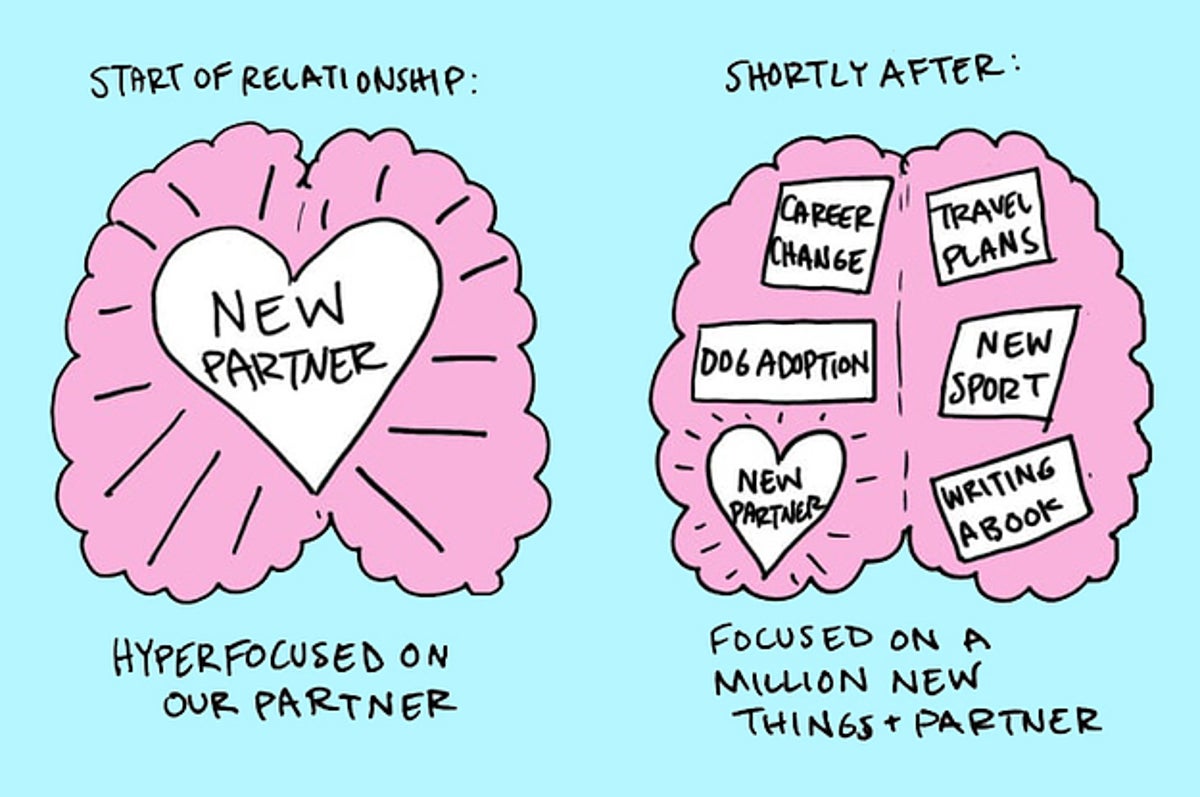
The first step to dealing with ADHD in your relationship is accepting that the symptoms are not going away. This may be a difficult pill for you or your partner to swallow, but it is important to understand and accept the fact that the symptoms of ADHD will never go away completely.
It can be helpful if both partners read books on ADHD together so they can learn more about the condition and what to expect. As both partners need to learn how ADHD affects them directly, as well as their partner. It is also helpful if they can identify any of their issues that may be getting in the way (such as past traumas or unresolved family problems). This enables you to work together as a team, rather than against each other.
The next step is to continue to learn about ADHD and how it affects relationships. Many books on the subject can be extremely helpful for both of you (see recommended reading below). You may also want to see if there is an adult ADHD support group in your area where you can talk to other couples who are dealing with the same issues.
Finally, it is important to remember that change takes time. You will not be able to fix everything overnight, but if you work together and take things one step at a time, you can make progress.
Helping Your Partner With ADHD
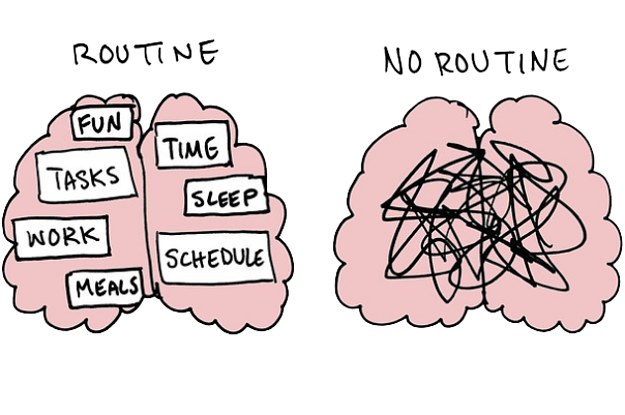
The most important step in helping your partner with ADHD to improve their behavior and be more supportive of you is by leading by example. If they see you doing what it takes to keep things together, then there is a good chance that they will follow suit and do the same thing.
How You Can Help Your Partner With ADHD?
Gaining an understanding of ADHD and what it can mean in terms of relationships from either side will also help tremendously when it comes to working together to have a successful and fulfilling partnership. Apart from this:
Be Patient
The person with ADHD is not trying to be difficult on purpose. They are just having a hard time dealing with everything that is going on in their life. So be patient and understanding, and never lose your temper or lash out at them.
Encourage Them To Seek Help
If the condition is causing significant problems in your relationship, or if the person with ADHD is not taking responsibility for their actions and making an effort to improve the relationship, it may be time to get some help.
Stay Positive And Encouraging
When you have ADHD, your mind can often start racing negatively. You think about all of these things that you need to do and all of the things that could go wrong. You may find it difficult to stay positive and encouraging, but this is crucial for improving your relationship with others.
Don’t Take Things Personally And Don’t Blame Others For Your Feelings
When you have ADHD, it’s easy to take everything personally and blame other people for how you feel. But this is not fair to your partner, and it will only lead to more fights and disagreements.
Tips For Increasing Understanding In Your Relationship
If you have ADHD, it is important to remember that your partner did not sign up for this. No one chooses to live with a difficult condition or a disorder of any kind. So the first step in working on your relationship is to stop fighting and start communicating.
The person with ADHD needs to be completely honest about how they feel and what their needs are. And the non-ADHD partner needs to be patient, understanding, and supportive. It may take some time, but with patience and effort, your relationship can improve dramatically.
Put Yourself In Your Partner’s Shoes
When you have ADHD, it is often difficult to see things from your partner’s perspective. Your partner may seem irrational and overly demanding, while you feel that they don’t understand or appreciate all of the things you do for them daily.
To get past this barrier, it is important to put yourself in your partner’s shoes whenever possible. Think about how hard it must be for them to always have to do so much more than you. Think about how hard life must be for them, and try not to take everything they say too personally or as a direct attack on your character.
Take Responsibility For Your Role In The Relationship
If you have ADHD, it is important to realize that this condition does not give you an excuse to behave poorly. You are still responsible for your actions and the way you treat your partner.
Remember that your partner is not a mind reader, and they cannot possibly know what is going on in your head at all times. If you need something or want something, be sure to communicate that effectively so there is no confusion.
Work Together As A Team
When you have ADHD, it is easy to go off on your own and do whatever feels good right then. You may even convince yourself that this is the best way for everyone involved because all of those other things just get in the way. But when you make a conscious effort to work together as a team and communicate effectively with each other, you will find that the relationship is much stronger in the end.
Practical Tips For Relationships With ADHD
Communication is the key to success in any relationship, and this can be especially true when you have ADHD. The ability to communicate effectively with your partner regularly will go a long way towards making sure that both of you are happy as well. Here are some more practical tips for relationships with ADHD:
- Make an effort to take an interest in the things that your partner is interested in, even if you don’t share the same interests. This will show them that you care about them and want to be a part of their life.
- Try not to put too much pressure on yourself or your partner. ADHD can often lead to feelings of stress and anxiety, so it’s important to not feel guilty or put too much pressure on yourself when things don’t go right.
- Don’t be afraid of taking risks with your partner, even if you’re worried that it could lead to a negative outcome at times. There are plenty of successful people in the world who made mistakes along the way and learned from them as well – so don’t be afraid to take some risks along the way as well.
- You and your partner need to recognize that even though ADHD can cause a lot of problems in relationships, it is not an excuse for bad behavior or poor treatment of others. You should both strive to rise above these issues and treat each other with respect at all times.
- Don’t forget to have fun together as well! Spending time with your partner and making sure that you both feel appreciated is one of the keys to a successful relationship, so don’t let ADHD stand in your way.
NOTE: Gaining an understanding of ADHD and what it can mean in terms of relationships from either side will also help tremendously when it comes to working together to have a successful and fulfilling partnership.
Movies And Books On ADHD Relationship Challenges
Books:
The ADHD Effect on Marriage (Dr. Charles Parker)
ADHD and Relationships Book of Answers for Couples with ADHD (Nicole A. Taylor, Ph.D. & Lara Honos-Webb, PsyD MFT)
Driven To Distraction In Love (Russell Barkley Ph.D.)
Movies:
ADHD In Love (DVD film) – Directed by Hank Williams III ~ Synopsis from Amazon: “When a young man who suffers from ADHD falls in love with a beautiful woman, he must choose to either get treatment for his disorder or risk losing her. The film follows several characters through their daily routines as they struggle with various aspects of everyday life while dealing with issues related to this common condition.”
Expert Comments On ADHD And Relationships
“When one person has ADHD, it is like two people in a marriage,” says Dr. Roberto Olivardia of Harvard University’s Department of Psychology. “You have to work together as a team.” This means compromise on both sides with neither partner expecting more than they can give.
Case Study: ADHD And Relationships
A man in his mid-thirties came to me for counseling because he was struggling with depression. He had recently gone through a painful divorce after seven years of marriage, and the breakup left him feeling discouraged about ever having another serious relationship again. As we talked more in-depth, it became clear that much of his depression was linked to his ADHD.
He explained that he had always been a bit impulsive and scattered, but the ADHD symptoms became much more pronounced after he got married. His wife had never been diagnosed with ADHD, but she had her share of challenges.
They constantly fought about simple things like cleaning up the house or getting dinner on the table on time. His wife would get angry and frustrated, and he would withdraw into himself or lash out in anger. The situation finally came to a head one night when they got into a huge argument that led to them calling it quits.
Looking back, the man with ADHD realized that he had never taken any responsibility for his role in the relationship. He always expected his wife to manage everything and be perfectly organized, which was an impossible task. When things went wrong, he would get angry or depressed instead of trying to work together with her to fix the problem.
The Key Message
If you are in a relationship with someone who has ADHD, it is important to remember that there is no single “cure” for this condition. They will always have ADHD, and they will still be who they are even when you get married or move in together.
But there are steps that you can take to make things better over time instead of worse. The best thing is not only to learn how to work around the symptoms but also to try your best to understand what your partner is going through. This can be a difficult task, but it is definitely worth the effort in the end.
Talking To a Professional
If you are finding it difficult to cope with ADHD and its effects on your relationship, it may be helpful to talk to a professional. Someone who is trained in this area can help you understand the condition better and give you some tips for how to improve things.
Conclusion
If you have ADHD, it is important to remember that your partner did not sign up for this either. And if you are in a relationship with someone who has ADHD, then there is no reason why the two of you cannot improve things and make them better over time. Just be sure to follow the tips above, and be patient while doing so.
A Word From Mantra Care
Your mental health — your psychological, emotional, and social well-being — has an impact on every aspect of your life. Positive mental health essentially allows you to effectively deal with life’s everyday challenges.
At Mantra Care, we have a team of therapists who provide affordable online therapy to assist you with issues such as depression, anxiety, stress, relationship, OCD, LGBTQ, and PTSD. You can take our mental health test. You can also book a free therapy or download our free Android or iOS app.
